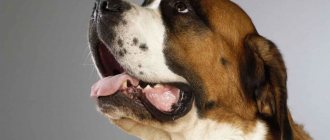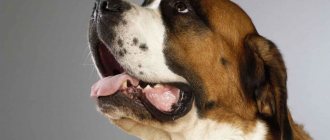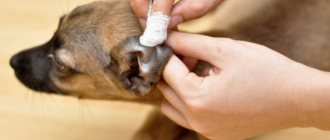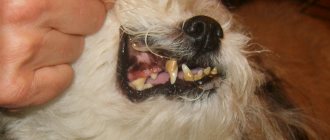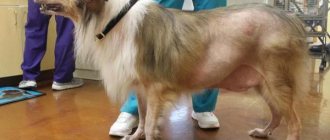The dog smells fishy: the main reasons
An unpleasant fishy or any other odor emanating from the dog’s fur, body, mouth, external genitalia, ears most often signals some kind of malfunction in the pet’s body. Therefore, the sooner the cause is found out and the problem is eliminated, the less chance there is of developing serious pathologies and diseases.
Causes of a fishy odor from a dog:
- strong emotional experience, frequent stress;
- metabolic disorder;
- acute, chronic dermatological diseases of various etiologies;
- unbalanced diet, errors in feeding;
- hormonal imbalance;
- endocrine diseases (diabetes mellitus);
- disruption of the functioning of the gastrointestinal tract (gastritis, pancreatitis, liver disease);
- oncological processes;
- dental diseases (gingivitis, stomatitis, caries);
- helminthic infestations, the presence of ectoparasites;
- parasitic infections;
- allergies of various types;
- chronic diseases of internal organs;
- problems in the functioning of the respiratory tract (breathing organs);
- diseases of the kidneys and genitourinary tract.
If a fishy smell comes from the mouth, it is possible that the pet has developed inflammatory processes in the digestive tract or dental diseases (gum disease).
If the tail stinks of fish, the main reason is blockage of the paraanal glands, pathologies of the genitourinary system. In bitches, a fishy odor is most often noted during estrus.
Pug wrinkles
The folds of skin on a Pug are what makes them so cute and adorable. However, folds can also be one of the main reasons why your pug is wilting.
The Pug has wrinkles around the neck and face area that are not easy to keep clean. Dirt, food and grime easily get stuck in the folds of the skin.
Wrinkles are also a great source of bacteria, most commonly yeast, which loves a warm, dark environment. Growing bacteria may be the reason your pug is smelling and likely scratching uncontrollably at the folds of his skin.
When does a fishy stench signal trouble?
If your dog suddenly begins to emit an unpleasant, pungent fishy odor, pay attention to the health and behavior of the pet. Owners should be alert to the following symptoms:
- dull, faded, brittle wool;
- the presence of foci of inflammation on the skin, ulcers, wounds;
- accumulation of wax, black plaque on the ears;
- sudden weight loss, loss of appetite;
- low activity, depressed state;
- severe itching;
- problems with chewing food;
- unstable stool, nausea, vomiting;
- unpleasant odor of urine, discoloration, frequent painful urination;
- ulcers, wounds on the oral mucosa;
- ear diseases (ear mites);
- fungal infections (mycoses);
- discharge from the nose, eyes.
What to wash so it doesn't stink
To get rid of the unpleasant odor, first of all, it is recommended to try Nizoral medicinal shampoo, diluted with water in a 1:1 ratio (sold in a pharmacy for people). The pet's body must be moistened with water, the fur and skin thoroughly washed, and left for 10 minutes. The optimal frequency of the procedure is with an interval of 5-6 days.
Shampoo Nizoral
If bald spots form on the body, then you should not postpone a visit to the veterinarian. He will scrape off the sources of the lesion, after which he will develop a therapeutic course.
Harmless reasons
The main source of dog odor is specific secretory sebaceous glands located in the dermis. The intensity of their work depends on age, emotional state, individual, physiological characteristics of the body, conditions of detention, and climatic conditions.
Important! Males emit a stronger odor than females. The reason is the increased production of hormones, which, unlike female dogs, are constantly produced.
A dog may smell fishy due to the presence of a large amount of fresh river and sea fish in the pet’s diet. An unbalanced diet, violation of the daily routine can also cause this phenomenon. By adjusting the diet, after normalizing the metabolism, the problem of fishy odor, if the dog does not suffer from chronic gastrointestinal diseases, will be solved.
A not-so-pleasant smell from a dog may be due to breed and genetic characteristics. For example, basset hounds, American cocker spaniels, pointers, and Newfoundlands can emit odors that are unpleasant to humans (the smell of fish, dog) during certain periods of life (sexual heat, puberty, excessive physical activity).
A fishy odor from dogs can also be caused by seasonal shedding, poor hygiene, improper coat care, and age-related changes in the body.
How to get rid of dog smell
A stinking dog, namely one that exudes the smell of a dog, is an animal that is poorly cared for. There are several most effective ways to exclude this:
- You can wash your pet thoroughly if the cause is dirty fur.
- Carry out appropriate treatment when the animal is sick or there is a blockage of the sebaceous glands.
- During the summer, you can trim your dog's fur. This is especially true for breeds whose wool certainly requires such a procedure.
- Bad breath can be eliminated by brushing your teeth and mouth.
- Try changing or adjusting the animal’s diet to affect the functioning of the sebaceous glands.
The surest way to get rid of dog smell is bathing
. Important! When determining how to deal with the problem, it is worth finding out in more detail about the dog’s health status, in particular, about the presence of pregnancy.
If the dog smell is caused by estrus or pregnancy, then you cannot get rid of it.
Sometimes a whole range of measures is organized to combat such a nuisance. You can wash the bedding, disinfect the floor, textiles and furniture on which the dog often lies to prevent the fur from being “scented” again.
Prevention
To avoid the appearance of a fishy odor, do not be lazy to spend time on your dog’s hygiene. Groom six, use the right dog bath products, and brush your dog's teeth two to three times a month to avoid plaque and dental problems.
Inspect the dog's body and ears after each walk. For hygienic treatment of ears, use the correct products for animals.
Important! Keep the bowls, bedding, and house where your pet sleeps and rests clean.
Don’t forget to drive away worms and treat the fur against ectoparasites. Take your pet to the clinic twice a year for a comprehensive examination.
How to get rid of odor in a puppy
A puppy may pick up an unpleasant dog odor from its mother during breastfeeding. He may experience hormonal changes during the growth process. Sometimes separation from the mother provokes such trouble (stress). But not all methods of solving the problem that are used for an adult are suitable for puppies.
A veterinarian will determine how to combat dog odor in puppies.
Important! It is advisable to consult a veterinarian before taking any action of a certain nature.
The most relevant option is periodic bathing. If the basis of the stench is the stress suffered due to separation from the mother, then it takes some time to eliminate the smell. During this period, you need to thoroughly clean the house and wash the puppy’s bedding. During the growth period, you can give him special vitamins and microelements.
Rotten foods
The smell of mustiness and mold can occur if the animal is experiencing fear and stress.
- The cause of fear can be anything in the house, from household appliances to large soft toys.
- Stress is very closely related to physical sensations; it often accompanies long-term pain.
It will be quite difficult to find out the specific cause; it is recommended to seek the help of a specialist.
External factors influencing unpleasant odor from the mouth
The most common external triggers for the formation of an unpleasant odor are:
- The daily diet contains a high concentration of protein. When such foods are digested, a large amount of nitrogen is released, hence the putrid odor.
- Deposition of food remains behind the jowls of brachycephalic animals. People with short muzzles often do not have time to swallow all the food while eating; its remains accumulate in the cheek space, where they rot and emit an unpleasant odor.
- The animal is given only chlorinated water to drink. It is important to understand that the cause of the development of dysbiosis can be a refusal to use bottled or spring water. And dysbacteriosis is already a significant reason for the appearance of an unpleasant odor.
Additionally, it is worth noting an unbalanced diet that is not suitable for the pet. If difficulties arise in developing a diet, it is better to seek help from a veterinarian or breeder.
NO low quality chlorinated water

